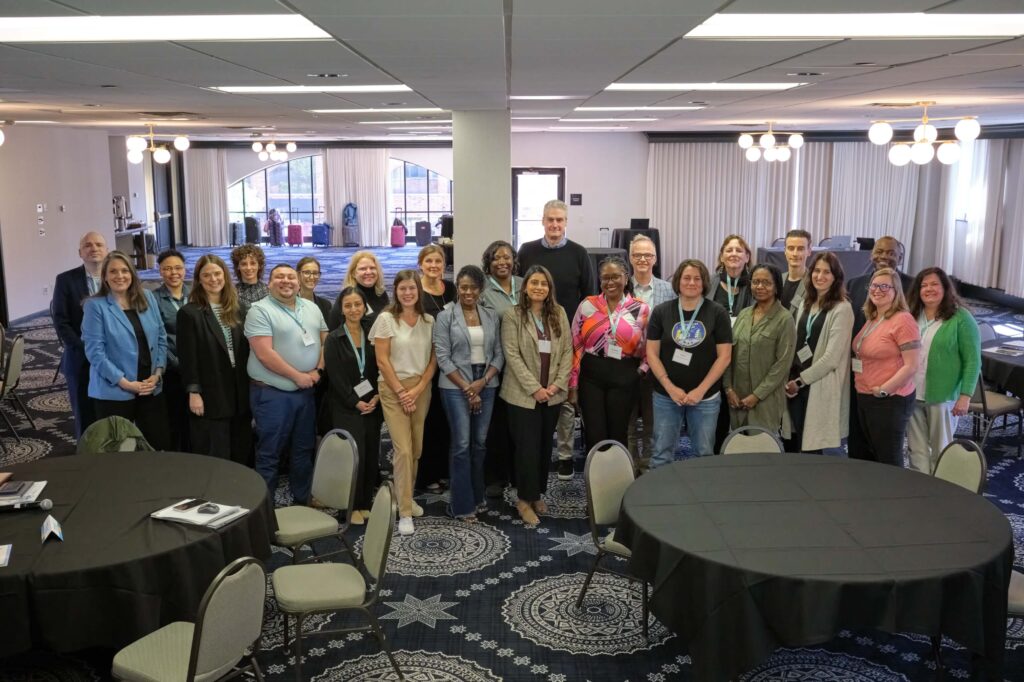
The Jed Foundation (JED) teamed up with the State Higher Education Executive Officers Association (SHEEO) in 2023 to launch the SHEEO-JED Mental Health and Wellness Learning Community. Recognizing that students’ deep mental health needs require coordinated action at all levels, this innovative initiative brought together state-level higher education leaders, practitioners, and other stakeholders to focus on state-level policy interventions aimed at improving college student well-being. A report published earlier this month, Building Momentum: Collaborative Solutions for State-Level Student Mental Health, highlights initiatives and insights from states participating in the learning community, including Arizona, Louisiana, Oregon, Pennsylvania, and Texas.
The report, published by SHEEO, was authored by SHEEO experts Sakshee Chawla, Dr. John Lane, and Dr. Tom Harnisch, along with Dr. Zainab Okolo, JED’s Senior Vice President of Policy, Advocacy, and Government Relations.
Among the topics the report explores are:
- Collaborating across sectors, including with philanthropy and public health
- Data-driven advocacy, including demonstrating return on investment
- Addressing workforce shortages and building mental health capacity
- Expanding telehealth and technology-enabled solutions, including AI
- Reducing shame and secrecy around mental health, such as by using social media and influencers for awareness campaigns
“States participating in the SHEEO-JED Mental Health and Wellness Learning Community have laid the groundwork for transformative mental health initiatives, integrating student well-being into broader educational and workforce strategies,” the authors write in the report’s conclusion. “However, sustaining and expanding these efforts requires a long-term vision and actionable next steps to address emerging challenges and solidify systemic improvements.”
Key lessons from participating states include:
- Arizona: The state is building on its Student Well-Being Workgroup to make mental health a priority within the Arizona Board of Regents. By aligning mental health initiatives with economic and workforce development goals, Arizona is working to bring continuity across educational stages and highlighting the role of mental health in preparing students to be resilient and prepared members of the workforce.
- Louisiana: In partnership with the Louisiana Department of Health and local health offices, Louisiana focuses on training campus staff in mental health interventions and ensuring sustainable funding, emphasizing the importance of continuity and collaboration.
 Oregon: Prioritizing data-driven policy development, Oregon uses insights from statewide surveys to implement regular mental health assessments and strengthen culturally responsive services, reflecting the diverse needs of its student population.
Oregon: Prioritizing data-driven policy development, Oregon uses insights from statewide surveys to implement regular mental health assessments and strengthen culturally responsive services, reflecting the diverse needs of its student population.- Pennsylvania: Pennsylvania focuses on strengthening transitions between K-12 and higher education. This approach aims to create a seamless care network, ensuring mental health support is accessible and consistent as students progress academically. These efforts draw on insights from the Higher Education Suicide Prevention Coalition and the PA MASLOW: A Hierarchy of Collegiate Basic Needs initiative.
- Texas: The Building a Talent Strong Texas strategy integrates mental health into broader educational and workforce goals, with a goal of providing seamless support across educational pathways to comprehensively address workforce needs.
The SHEEO-JED Mental Health and Wellness Learning Community is part of an ongoing national conversation about post-pandemic student mental health. It emphasizes the integration of mental health support into all aspects of the educational experience, focusing on both system-level and state-level policy interventions. The aim is to create a sustainable framework for student well-being that addresses both acute needs and long-term challenges.

Building on this groundwork, the next phase of the initiative, a second cohort of the SHEEO-JED Mental Health and Wellness Learning Community, will concentrate on sustainable funding models and inclusive care systems. This focus addresses the critical challenge of securing long-term funding for mental health initiatives. The group will dive into state-level appropriations, sustainable funding strategies, and access to care.
Participants will explore successful models for obtaining state support, including data-driven advocacy and legislative engagement strategies. By developing comprehensive funding approaches, states can adapt these strategies to their specific needs, ensuring long-term sustainability.
The long-term vision for the SHEEO-JED learning community is to create lasting change in how states approach student mental health. By building a network of informed and connected leaders, the program aims to transform mental health services in higher education into a coordinated, sustainable system of care. Through these efforts, the learning community will continue to advance the national dialogue on student mental health, fostering more comprehensive, accessible, and sustainable care systems.
Read the full report: Building Momentum: Collaborative Solutions for State-Level Student Mental Health







 Oregon
Oregon